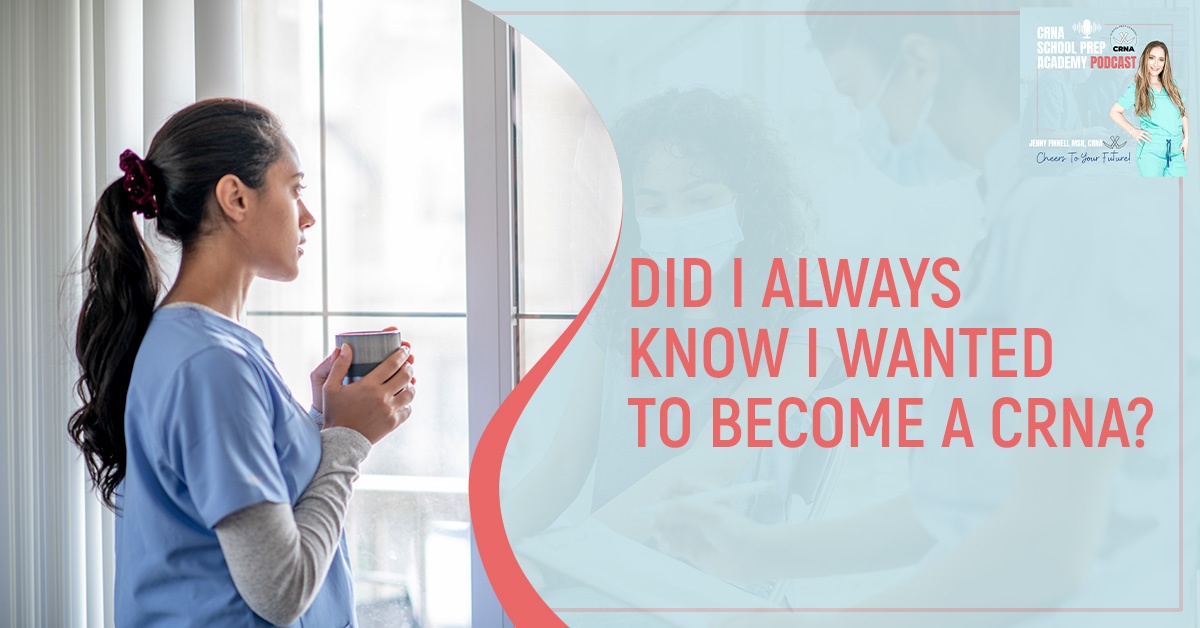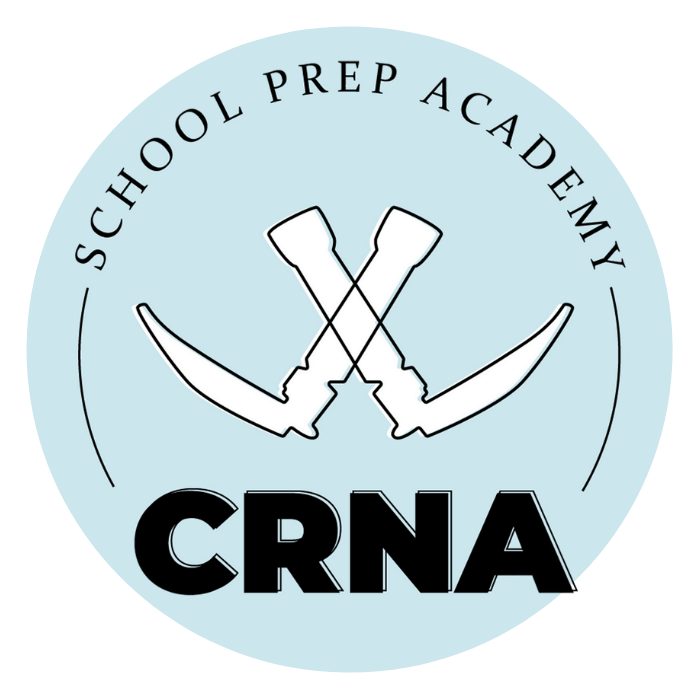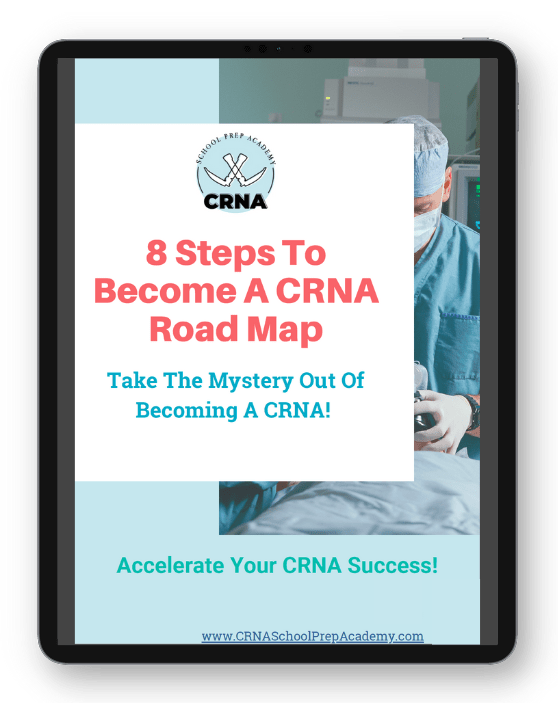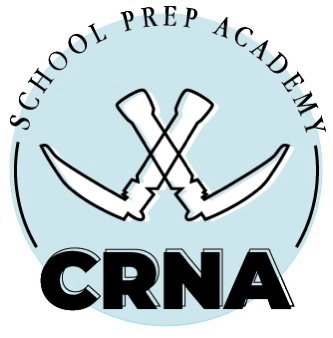
We live life the way we want to. Yes, we can! No matter the circumstance, how we turn out is all up to us. There may be hurdles along the way, testing our faith and conviction, but as long as we keep believing in ourselves, we live to try another day. In your journey to becoming a CRNA, whether or not you’ve always known that was the path for you, you will need to tap into your strengths and never give up—taking one persistent step at a time. So tune in and be inspired as Jenny Finnell shares how identifying opportunities, keeping the right mindset, and being resourceful can get you the tools you need to become the best CRNA you can be.
Get access to planning tools, valuable CRNA Faculty guidance & mapped out courses that have been proven to accelerate your CRNA success! Become a member of CRNA School Prep Academy here:
https://www.crnaschoolprepacademy.com/join
Book a mock interview, personal statement critique, resume review and more at https://www.TeachRN.com
Join the CSPA email list: https://www.cspaedu.com/podcast-email
Send Jenny an email or make a podcast request!
Hello@CRNASchoolPrepAcademy.com
—
Watch the episode here
Listen to the podcast here
Did I Always Know I Wanted To Become A CRNA?
Did I always know I wanted to become a CRNA? In this episode, I’m going to share with you my journey and what that one thing was that I started doing that fueled my success in achieving my goal of becoming a CRNA. I’m excited to share this with you. Let’s go ahead and dive in.
—
Welcome back to the show. I’m honored and grateful to share my journey of becoming a CRNA. I hope it helps you out there come to terms with your own journey. Ultimately, there is going to be some of you to whom this can relate. I’m sure I’m not alone in some of the challenges I went through at the beginning, in wrapping my brain around becoming a CRNA. Let’s go ahead and get into this episode.
I Did Not Know I Always Wanted To Become A CRNA
I did not always know I wanted to become a CRNA. I was not someone in high school that was like, “I’m going to be a CRNA.” That wasn’t me early on. I always knew I wanted to do something in the medical field because I was interested in medicine. I used to watch Discovery Health and surgery shows on TV. I always found it fascinating.
I did a lot of volunteering over my summers. It was mandatory. You have to volunteer in the summer, so I did every summer for three years in a row. I volunteered at the hospital, and because of that, it allowed me to expose myself to different areas and different specialties. I toyed with the idea of becoming a physical therapist, radiologist, or surgeon. I didn’t know what. I just knew I liked medical.
I did have a shadow experience in the OR in high school. Although, at the time, I had no idea what a CRNA was. I had no clue. I thought that was a lot of fun. At the time, I was like, “Being a surgeon would be cool,” but then, I was like, “I don’t know if I’m smart enough for that.” That’s what I thought. I also thought, “Can you have a family and be a surgeon? I don’t know if I can make it through med school and still start the family I want to start. I don’t know if I can hold my bladder for that long if I had a long case.”
These were the things that I thought about when I was in high school. I was like, “I don’t know if I have a strong enough bladder to be a surgeon.” I equally thought that maybe it wouldn’t be as easy for me to have a family as a woman. When you start college, you have to pick a major. I started at Ohio State and my major was rad tech, a radiology technician.
A week into my college career, I changed my major to nursing. I wish I could remember what I was thinking or what made me shift. The only thing I can remember from that early time was the fact that I got this gut feeling that the rad tech was not going to be a long-standing enjoyable position. X-ray is cool. I like interpreting x-ray. It’s fascinating, but I equally didn’t like the idea of being around radiation all day long. I was like, “If I want to do something else with it, that’s all I can do. I can’t do anything else.”
I like variety. Don’t get me wrong. I like consistency, but I equally like variety. I like challenges. I’m someone who thrives in difficult situations. I thrive when you put me in a situation where I don’t know what I’m doing. It sounds weird to say, but I enjoy it. It keeps me like, “I have got to figure this out.” It’s almost like a puzzle where I’ve got to figure this out. I felt like it would be monotonous and boring to do the same thing for my entire career as a rad tech. That’s what ultimately led me to pick nursing. I thought, “There are lots of options in nursing. I could be any kind of nurse. I can sub-specialize. I can go to grad school. Let’s do that. At least I have more options.” I made that pivot to nursing. I’m glad I did.
Whenever you feel like you can't do something, you always have to try. And if you don't succeed, learn from that failure, and try again, knowing more the next time. Click To TweetLimiting Beliefs
At the time, CRNA was not on my radar. I didn’t know what a CRNA was. I had heard of it. I thought it sounded super cool, but I equally remember being like, “You’re not smart enough for that. You’ll never become a CRNA. Only the smartest people go to CRNA school.” That’s what I thought as a little freshman in college who picked nursing as their degree.
Mind you, that first year in my college rocked me. I didn’t get into the college of nursing because I didn’t have good enough grades. It was devastating. To those of you who have followed this show for a while, I’ve shared a little bit about my background as a child. I struggled in grade school. High school was a little bit better. In grade school, mostly, I struggled a lot. I was put in remedial courses, all kinds of tutoring, and multiple IQ tests to try to figure out what was wrong with me.
As a young child, I remember thinking, “They keep sending me for this IQ test. That must mean I’m stupid. They must think I’m stupid.” That’s what I thought, unfortunately. I found out later on, I was in high school, my teacher finally pointed out that I have dyslexia. I have a mild form of dyslexia. I can function, but that has always been something that has caused me more difficulty with standardized tests and methods of learning. It doesn’t work for me. My brain doesn’t function that way, and there’s nothing wrong with that. It’s okay.
In fact, some of the smartest people in the world are people who have said they had to struggle with dyslexia. They figured out another way. They have to because traditional ways don’t work. They’re resourceful. That’s honestly how it has aided in my success. It’s because I became resourceful, but only out of facing failure over and over again.
With all that being said, I got to college. It rocked me. I barely had a 3.1. I couldn’t get into the college of nursing. I had two choices. I had a choice to go home and live with my parents or figure out how to stay at Ohio State. I had to get straight A’s if I was ever going to get my GPA up high enough to get into the college of nursing, and I had never gotten straight A’s ever. That was a pivotal moment for me in my life because I made a decision to say yes to myself. I said, “I have to try.” That was that key phrase right there. It was, “I have to try”; that ultimately got me into CRNA school.
I hope you got goosebumps because it’s that simple. You have to try. Back then, I knew if I didn’t try to set it as my hard goal to get straight A’s that I wouldn’t get straight A’s. I had to believe I could physically. I knew that if I had any doubt on my mind that I could achieve this, then I wouldn’t achieve it. Historically, what I did as a child is I did that to myself. I was like, “I won’t be able to get A’s because I’m not capable. I’m slower. I’m a slower reader. I’ve never gotten a single spelling bee because I cannot spell.” I’m still terrible at spelling.
Challenge Yourself
I had all these beliefs of, “It’s not capable for me. I don’t have it in me to do it.” From a young age, I thought my brain was different. I thought I was not meant to be that smart, straight-A student because I was wired differently and my brain was not capable of it. It’s so not true. I got to that pivotal point in my college career where I was like, “I have to try. I have to figure this out. I’ve got to challenge myself to figure this out. Let’s figure this out. Let’s do it because I’m not going home to live with my parents.”
At the time, I loved Ohio State. I’m married to my husband of twelve years. I met him in my freshman year in college. I was already completely infatuated with him. I didn’t know we were going to get married, but I was like, “I’m not leaving my prince charming in college. I have to figure out how to stay here.” I wanted it bad. I wanted to stay at Ohio State. I also had a good group of girlfriends. They’re still my good friends. They’ve been my friends since freshman year in college.
It was like the universe opened. I found my dream man and my girls for life. I didn’t want to leave. I had a lot of motivation to be like, “I’ve got to figure this out. I’ve got to figure out how to get straight A’s.” Long story short, I tried every study technique I could find on Google. I tried everything. I kept trying different ways. I was testing and testing. I was going to every office hour or every TA hour. I would sit in the front of the room. I would ask questions. I would stay after class. I was the annoying student who never left the professor alone. I knew I had to try something else because what I was traditionally doing, which was trying to do what everyone else was doing, was not working.
Eventually, it worked. I got straight A’s. Here’s what my brain did, though. This is why I’m sharing this backstory with you. I want you to recognize if you’re doing this to yourself. I knew I was doing this to myself, but it took years for me to realize what that did to me mentally. I got straight A’s. I was excited and proud of myself for getting straight A’s, but here’s what I did…this is where I want to catch some of you if you’re doing it.
I got into the college of nursing the second time I applied. When I got into the college of nursing, I suffered from impostor syndrome because I felt like I didn’t belong there. I felt like I wasn’t truly smart enough still to be in the college of nursing because I did get rejected. I had never been a great student, but somehow, I got straight A’s. I remember feeling, “That straight-A student is not who I am. I’m not a straight-A student. I am the slow one. I am the one who needs a slower reading group and math group. I’m someone who’s questioned all the time if I have a low IQ, what’s wrong with me, or why I can’t get good grades.”
I had this impostor syndrome when I went into the college of nursing that I didn’t belong. I remember thinking I faked it. I remember thinking, “I faked my way in here. I cheated,” even though I didn’t cheat. I never cheated, but I took easier courses, like How to Avoid Getting Cancer and Exercise Science. I equally took some hard courses. I took Biology and Algebra. Since I took some easy courses knowing that they’d probably be easier As, I told myself I truly didn’t deserve those straight A’s because they weren’t the harder classes.
In the harder classes, I still struggled. I got straight A’s, but they were in easy classes. I poo-pooed my own achievement. I’m like, “Why would I do that?” Even now, I’m like, “Why would I do that?” That in itself was this toxic loop that I found myself in forever more. Honestly, with the fact that I figured out how to study, I continued my nursing journey and did well in school. It wasn’t easy, but I got gritty that year when I had to get straight A’s and I figured it out. I kept that same effort throughout the rest of my time and then finished strong.
I graduated with a 3.7 GPA overall. Science GPA was a 3.4. With that being said, I always felt this impostor syndrome that I was still not that smart student even though I stuck with getting A’s for the rest of my college career in undergrad and even in grad school. I still felt like I was hiding behind a wall of, “I’m not a smart student. I don’t know how I made it here, but I did. I’m not deserving.” I told myself, “I’m not deserving,” and that’s so toxic. It’s not going to serve you. It’s not going to help you.

I still find myself occasionally falling back into that toxic mindset, but I’m quick to snap myself out of it. I know how important a good mindset is. I actively work on it every single day. That is the only way I can show up and serve you as a CRNA, as the leader of the CRNA School Prep Academy, as a mom, and as a wife. If I have a good mental mindset, I can be there for you. I can be there for others. I have to check myself before I wreck myself almost every single day.
Don’t Stop Trying
I want to, at least, get you thinking about that because the sooner you start recognizing what you’re doing to yourself, the better and more rewarding your life’s going to be. You’re going to be happier. You’re going to feel more fulfilled. You will find more success. If you’re looking for failure, you’re going to find it. If you’re looking for success, you’re also going to find it. Look for success and don’t let the fear of failure be what you’re looking for. It can always happen, but so can success, so why not try?
Let’s get back to that. Why not try? I told myself that one thing. I was like, “I have to try.” I knew if I didn’t try, I would fail. If I don’t try, that’s a 100% failure. If I do try, I’ve got some odds. I’m gambling with myself. What better gamble than on yourself? The only way you truly fail is if you don’t try. If you stop trying, you’re like, “I’m done.”
I’m not saying to give up on something means you’re a failure. It’s not. You’re going to pursue something in your life on an occasion where you’re like, “This is not what I thought it was going to be. I’m not interested anymore.” That’s okay. Sometimes, you don’t know what you don’t know until you get into it. I’m not saying that that’s wrong or that you should be shameful. It’s not at all.
I equally think if you keep that desire and that passion even after you start pursuing it and trying, you are doing yourself a disservice by stopping the trying. You need to keep trying. You need to be willing to face failure over and over again until you succeed, and you will. That’s the beauty of it. The more attempts you make, the more odds you’re giving yourself to succeed.
The more attempts you make, the more odds you're giving yourself to succeed. Click To TweetI’m speaking to you. I have heard so many inspirational stories from you of facing rejection thirteen different times, if not more. You are students coming from overseas with English as their second language, and yet, you’re still finding success. Was it on your 1st, 2nd, 3rd, or 4th attempt? No. It might have been on your eighth attempt, but you still did it. Do you know why? It was because you kept trying. You kept getting gritty and figuring it out. You kept saying, “I have to find a way. I’ll find the tools, resources, and knowledge I didn’t have before that’s going to get me to where I want to go.” That’s the beauty of it.
Acknowledging The Passion
There’s information out there. You just have to be willing to look for it and seek it out. That’s why you’re here. That’s why you’re tuning in to the show. That’s my soapbox story that you have to recognize toxic language if you’re doing it to yourself. Let’s go back to where I was. I got into the college of nursing. I still faced these limited beliefs where I was hiding behind this film of, “I’m not that smart student.” Yet, I was doing well. I got my GPA from 3.1 to 3.7. That’s a giant leap. To get into nursing school, I got to have a 3.5. I don’t care what classes I took. That’s an amazing accomplishment.
You have to recognize the toxic language, especially if you're doing it to yourself. Click To TweetI continued on my nursing journey. At that moment in time of being a freshman in nursing school, I was a junior in college. Mind you, I had to apply my sophomore year and got in. I was a junior in college. At that time, I saw nursing as like, “Let’s figure out a specialty, whether that’s labor and delivery, renal, ICU, peds, or oncology.” I saw it as, “Let’s figure out what my special sauce is. Where do I want to be?”
Here’s the thing. Secretly, I wanted to become a CRNA. In the deepest part of my brain, I knew I would thrive in it. Granted, I had not spent time shadowing. I’d been researching it online quietly. I had been in the OR and I had shadowed. I was like, “I love the OR.” I’ve been watching Discovery Health and The Surgery since I was five years old. I knew I would thrive in that environment. I knew I loved pathophysiology and pharmacology. I knew it would be a good fit, but I equally was like, “That’s the smartest of the smartest.” That limiting belief kept taunting me, saying, “You’ve accomplished a lot, but you’re still not good enough.” It’s so toxic.
Long story short, I denied that feeling for a while. Yet, it didn’t go away. It stayed with me where I was like, “I really want to become a CRNA, but I don’t know if I can.” I was torn, but I didn’t tell anyone other than a few close friends and family. There is one of those moments that I will never forget because it stuck with me. I met my husband when I was eighteen years old in college. I went to visit his family. It wasn’t probably the first visit. I don’t remember, honestly, what point in time this visit happened. It was after I got a little more serious about CRNA. It was after I was like, “I’m going to go for this.”
That Pivotal Moment
They asked me, “What do you want to do with your nursing degree?” I was like, “I want to become a CRNA.” I remember his dad saying, “You better hold onto this one. She’s a keeper.” I remember being like, “If I don’t achieve becoming a CRNA, am I going to be less desirable then?” I remember taking offense to it, not in a way that I was mad, but in a way that I beat myself up.
I was like, “What if you don’t? What are you going to be? You’re going to be dumb Jenny again.” I remember having that toxic thought. I remember recognizing it and being like, “Why am I letting that get to me? I’m going to become a CRNA. I am a keeper regardless of what I am.” I put it back. I was like, “I’m going to do this.” It was into my senior since I did five years of undergrad because I didn’t get in.
During my first year in the nursing school program, I took a job as a student nurse’s aide. After you complete your first semester in nursing school, you qualify to become an SNA, which is a Student Nurse Assistant. You don’t have to take any classes. You get to do it. I was like, “I might as well do this because that way, I’m going to get exposure to different nursing specialties, talk to nurses, see what they like and don’t like, and get more exposure to what I’m getting myself into.” I was like, “What am I doing with my life? Let’s figure that out.”
I took that position. That was a hard position, but I did it. I started on a peripheral vascular disease floor. I would occasionally rotate to an open heart unit. I feel like every time I did, I had a traumatic experience where I’d see a code. I was like, “How often do they have codes up there?” It was probably not as often, but for whatever reason, when I would go up there, I would be involved in a code. I was like, “I don’t know if I can even handle this. This is too scary.”
It was very overwhelming at the time. During that time, it was my first year in nursing school and my junior year in college. I started adapting the mindset of, “I have to try. I have to, at least, try for CRNA.” I knew that in order to try, I had to fully believe it, which meant I had to speak it, own it, and be accountable. I was like, “I’ve got to share with everyone and their brother. That’s what I’m going to do.”
In order to give something a try, you have to fully believe it, speak it, and own it. This means you have to be accountable. Click To TweetI started becoming more vocal about becoming a CRNA. I started telling everyone that was my goal, even though there was a part of me that hesitated a little bit. I was scared, even so much so that I remember that right before I made a shift to the ICU to work as a nurse’s aide, I started researching other career paths. I started researching becoming a PA. I researched AA. I didn’t even want to say those words, but I did because I was scared. I wasn’t going to make it. That’s why I researched it. I was like, “Is there another avenue? If there is, what if I don’t get in? What would I do? What do PAs do? Would I want to be a PA or a nurse practitioner?” I started researching other avenues because I was afraid.
I see this all the time in CRNA School Prep Academy. I have students who say, “My backup plan is this. I’m going to do it. I’m still going to try for CRNA and I’m going to do this backup plan.” I’m like, “You’re not 100% committing to becoming a CRNA. That’s what it is. You’re so afraid of failure that you’re not 100% committing. I’m telling you right now that because you’re doing that, you’re not going to give it the best try. You’re not going to give it all your effort. You’re giving half your effort here and half your effort here. Are you more likely to succeed? You’re not. You’re more likely to not succeed because you’re not giving it your all.”
I want to stress to you how important it is. If you want to be a CRNA, you have to put all your eggs in that basket. Go for it and go again. It takes a lot of dedication and drive to stick with this path versus saying, “I’m going to do a backup plan and then still do CRNA.” I’m not saying it doesn’t always work out. Sometimes, it does, but there’s no reason to do it. Put it all, give it your all, and go for the gusto. Go for the goal. Get what you want versus trying to divert your path. It’s like you’re spreading yourself in two different directions. It’s not going to ever be as streamlined or as easy to achieve the goal if you’re toying with two other ideas.

CRNA Journey
At that point, I was doing it, too, but then, I finally made the decision. I was like, “If I’m going to go for this, there is no turning back.” It was all or nothing. Go big or go home. I went big and said, “There’s nothing else for me. This is all I want.” I started shadowing again. I shadowed my senior year in nursing school in the ICU. This was right around that time when I got that ICU rotation in nursing school. I begged to be in the ICU. I begged to get into the OR during this time.
Luckily, one of the instructors, I confided in her that I was interested in CRNA. I was like, “This is what I knew I needed to do to get there. I needed shadow experience. I needed the ICU experience. Can you please help me achieve my goal? This is what I want.” She was incredibly supportive of me. She got me the shadow day. She helped me get into the SICU for my ICU rotation in nursing school.
When I got into that shadow day, I lit up. I was like, “This is 100% what I want to do. I’m so excited.” I remember being so excited. That was going to be me someday. I remember thinking, “I’m going to be you maybe 5 or 6 years from now, but I’m going to be you. I’m going to know how to do that. I’m going to know how to drop those drugs.” It was incredibly overwhelming to watch them drop these drugs quickly, push it, and give it. I was like, “How do they even know what they’re doing?” I remember being like, “I’m going to learn and I’m going to do that. It’s not going to be scary because I’m going to know what I’m doing.”
It was humbling. It was watching something that you wanted so bad and being starstruck with your jaw dropped, like, “You’re so cool.” That was my experience when I went to the OR. I was excited. I was lit up. I knew it was what I wanted to do. It was my passion. It was my desire. I stuck with that. Whenever I would feel overwhelmed, scared, or that fear would creep in saying, “You’re not smart enough,” I would remember how that lit me up. I would remember how excited I was and how I got goosebumps on my arms. My hairy arms would stand up straight.
It was so invigorating to feel that passion when I got scared that I was like, “You’re gone, fear. I got you. I’m going to keep doing this. No fear is going to stop me from trying. I’m going to try.” I go back to that, “I’m going to try.” Whenever I feel like I can’t do something, I have to always say, “I’m going to try. If I don’t succeed, I’ll learn from that failure. I’ll try again knowing more the next time.” That has always served me well. I’ve known that because it got me from never getting straight A’s to getting straight A’s and graduating with straight A’s in nursing school. It got me where I was, so I knew it wouldn’t fail me. That’s what I got into going into my senior year in nursing school.

At that moment, I decided to make a pivot and go into the medical ICU as a nurse aide. That was one of the best decisions I ever made. It was incredibly hard. It was a hard position. It’s a lot of manual labor work. It was stressful, but I did it. It got me engulfed in the ICU environment. It got me learning ICU information, talking to the nurses, looking at how they’re handling it, what they’re doing, etc. It got me starting to think more like an ICU nurse, even though I was not a nurse. It also opened the doors to an ICU residency program.
Ultimately, I took a position there as an actual nurse in the medical ICU. Medical ICU was not my first choice, meaning I didn’t want to be in the medical ICU. I found that a depressing unit. It’s sad, full of death, suffering, and pain. It was hard. It’s probably one of the only times in my life that I’ve truly suffered from depression. I hated all the death and suffering. I liked the ICU part, but I hated the death and the suffering.
It made me physically sick to see people suffer. It felt like, “What am I doing? I’m coming here torturing people every day. This is awful.” With that being said, it wasn’t my first choice unit. I probably would’ve preferred something like an open heart unit or SICU, but those were my people. I felt like they raised me. When I became a nurse’s aide, those nurses on that unit were so incredibly powerful. They were like my work mothers and fathers. They were so nurturing. Plus, they begged me, like, “You’re not going to leave us, are you?”
I knew I would be okay there. I knew despite it being a hard unit to work on that I had support. I had people who genuinely cared about who I was and would support me and my career goals, so I took the position there. I was incredibly happy. Was it hard? It was incredibly hard. I cried all the time. I cried more during my three years as a MICU nurse than I probably have most of my life. It was that depressing for me. I don’t think I would’ve gotten through it if it wasn’t for that staff.
Would I have been happier in SICU? Probably, but it was a much colder unit. It was more spaced out and bigger. Also, the staff was not nearly as nice and forgiving. Even my girlfriend who worked down there would say, “People here are not very nice.” I’m like, “I’m happy I’m here in my little home where they’re all so loving and supportive.” It was such a depressing unit that you had to be that way to your coworkers. Otherwise, no one would make it.
I look back on that experience. As hard as it was, it was one of the most rewarding and eye-opening experiences I’ve ever had in my life. I want to leave you with this. When I became serious about becoming a CRNA, I probably did what you’re doing, which is looking at everything you have to do and getting overwhelmed. You’re like, “How am I supposed to do this all?” It was a lot.
What got me to getting straight A’s, getting where I was, and getting into the college of nursing was that I took little consistent actions. I took little consistent steps of doing things differently and figuring things out. I did trial and error, testing, looking things up, and trying something new. I adopted that same mindset of, “Do baby steps.” You don’t have to do everything. Do one more thing and be consistent with doing one more thing. Eventually, it will add up and stack up. You will accomplish a lot over a period of time.
I knew I needed time. I equally knew I was going to get married after college. That was a priority for me, not gunning into grad school. I knew I wanted to get married. I told my husband if he made me wait until after grad school that, he’d buy me a bigger rock. He was like, “Let’s do it.” That was joking aside. We got married. I wasn’t in a hurry. I knew I had to take the GRE and the CCRN. It still felt like a pretty good clip to apply to senior school. I had a lot to do.
Historically, I was not a good standardized test-taker. I struggled. I didn’t get into Ohio State my first year because my ACT and SAT scores were so low. I had to petition. My mom called and fought for me to get into Ohio State because my scores were not what they wanted. I don’t even know how she did it. My mom’s awesome. She fought for me to get into Ohio State.
I don’t do well in standardized tasks. I never have. I had to take that test more than once. I had to study for over eight months to take that test. In the first three months I studied, I didn’t do well. I studied for three more months and then took it. Maybe it was six months. I don’t remember. It was 6 or 8 months. It was right around there. I had to pay for tutoring. I wasn’t afraid to do so. Honestly, I had so many tutors in my life up until that point that tutoring, for me, felt like a no-brainer. I was like, “I need tutoring because I do.” I adopted that. That’s okay.
I got tutored all through my grade school. In college, when I needed to get straight A’s, I went to every TA hour. I went to a writing center. I looked for ways to find tutors in college because that’s what I needed. It wasn’t a question for me. I was like, “I’m going to pay for a tutor because that’s what I need.” I did that and it made a huge difference.
When I first applied to CRNA school, I barely missed the minimum GRE score to apply. They rejected my application. I called and I was like, “I have everything else. Look.” They were like, “No. You don’t meet that requirement.” I’m like, “You’ve got to be kidding me. I meet everything else over and beyond.” They were like, “No.” I was like, “That stinks.” That was my first experience.
Getting Through The Process With The Right Mindset
In the second experience, I got an interview. I retook the GRE and got a higher score. In my next application, I got an interview. I was like, “I could get in. I got an interview. This could happen.” I go to the interview. I almost got there late and almost hit the program director’s car. I’ve shared this one other time. I was getting lost. I was going through this parking garage and I’m like, “I can’t find where I’m supposed to go.” I was starting to freak out because I was going to be late. I was like, “I can’t believe I’m going to be late for my CRNA school interview.”
I’m driving through this parking garage. I turn and go in the wrong direction. I legit turn the wrong way down a parking garage and go the other way that I’m not supposed to go. I see an open spot and I’m parking. I was like, “I’m going to figure out how to get in that spot.” I gun it and I turn it into the spot. I was inches from clipping the car next to me, so I backed out 100 times, readjusted, and parked. When I got out and I look at the license plate of the car I almost hit, it said PhD, CRNA. I’m like, “That would’ve been bad. I would not have gotten into this program if I had hit the program director’s car.”
I go in for this interview. That frazzled me a little bit because I was like, “Oh, my God.” I got in there and the interview didn’t go so well. I thought I had prepared a lot, but you only know what you know. You don’t know what you don’t know. You walk into it and you’re like, “I’m ready,” and then you’re like, “No, I’m not.” That was my experience. I didn’t get in. That hurt. That was upsetting, but I equally knew I had more opportunities, so I was onto the next one.
I applied again and I got another interview. My first interview was in April and then my next interview was an October-ish time. There was some space between the two. My first rejection was in January. The interview was in April, and then it bombed. The next interview was in October of the same year. At the time I got rejected from the first one, I reached out and got some more connections, which I speak to all the time. I talked to a student, got some feedback, and got some tips.
I don’t think I did great. Don’t get me wrong. That interview was not like, “I aced it.” I did not get offered a spot on the spot. That was not me. I didn’t get everything right. I made some mistakes, but I did well enough that I got in. I got offered a spot and was super excited about that. I was like, “Yes.” It worked out. I want to share my story and the fact that it wasn’t all smooth sailing. You have got to keep trying.
If you don’t have the result that you want, you’ve got to figure out why and look for ways to improve. That’s ultimately what it always comes down to. It’s about looking for ways to improve, figuring out why that interview didn’t go well, questioning, and thinking, “How can I improve to be better next time?” When I got feedback on that, it was simply my interview skills. The feedback I got was that my interview skills needed to be touched up. That was the majority of my feedback.

I do this to myself, too. I was like, “You didn’t struggle at all. You’ve had it so good,” and I have. I’m incredibly grateful and honored to be where I’m at. I’m equally touched by how many of you have huge life events that happen, whether that’s to you or your close family members, and yet, you still persevere. I’m getting goosebumps even thinking about it because the stories that you guys have shared with me are life-changing. Please keep them coming.
Even if it’s a straightforward story, you’re equally unique in your journey to become a CRNA. When you share those stories, it inspires someone else to do what I hope I inspire you to do, which is to take action. Please keep me in mind. Share your story. Reach out to me on Instagram @CRNASchoolPrepAcademy. Send me your story. If you’re part of the CRNA School Prep Academy, post it in the Facebook group or the forum. We would love to hear your story because we share that. I know you know that.
If you’ve been following me, I love to share our student stories. It’s so inspiring to read someone else’s journey and how they got to where they did. It pushes other people to take a chance on themselves, which is ultimately the goal of this show. It’s to have you take a chance on yourself. It’s the best bet you’ll ever take.
I hope you guys found this helpful and encouraging. You have to start believing in yourself. You have to shift. If you’re dealing with a toxic mindset, it’s like one of those things where your mindset doesn’t get fixed. You don’t have a magic button you click and you’re like, “I’m good. I will never suffer from a poor mindset ever again.” I wish, but it doesn’t happen that way.
The way you get good at mindset is by being aware of the fact that every second of every day, you have a thought and you have an emotion with that thought. Those emotions and thoughts cause a visceral reaction in your body and they change your thought process. If you control how you feel about something, even if it isn’t going the way you want, you can then change the outcome because you’re going to think and feel differently. You’re going to do something differently. You’re going to take a different action than if you become scared or fearful.
If you don’t feel that fear or you’re not scared, you’re more likely not going to stop. You’re not going to freeze. That all comes from how you think and perceive and the types of emotions that that itself provokes. You’re like, “It’s over my head,” and it is. It’s a lot. It takes time. It’s something that you have to be cognizant of day in and day out.
I promise you. If you start adopting that, you’ll look back a year from now and be like, “I’m in a better place.” It takes a long runway to get there, and so does CRNA school. If you’re not a part of CRNA School Prep Academy, I highly encourage you to take that leap. That’s one thing. When you commit to becoming a part of CRNA School Prep Academy, that is you saying, “I am committed. I am doing this. I’m going to be loud and proud. I’m going to become a CRNA.”
I equally know that when students become a part of our academy and our community, they will be pushed to take action. They will be pushed to keep challenging themselves, face their fears, get over the hurdles, and learn how to adjust, adapt, navigate, and pivot. That’s what we’re here for. We’re here to help you, so you find that success.
I was faced with two options. It was to go home with my parents or to figure it out and stay in college where I wanted to be. It took a ton of me twisting, turning, asking, and looking for resources to do that. I am right here for you. CRNA School Prep Academy is here for you as a resource. I want to help you. If you’re a part of CSPA, I’m proud of you. If you’re not, I hope and implore you to come to check us out. You all have a wonderful day. Thank you so very much for tuning in. I will see you next time.
Important Links
- @CRNASchoolPrepAcademy – Instagram
- Facebook – CRNA School Prep Academy
- Forums – CRNA School Prep Academy
Get access to planning tools, valuable CRNA Faculty guidance & mapped out courses that have been proven to accelerate your CRNA success! Become a member of CRNA School Prep Academy here:
https://www.crnaschoolprepacademy.com/join
Book a mock interview, personal statement critique, resume review and more at https://www.TeachRN.com
Join the CSPA email list: https://www.cspaedu.com/podcast-email
Send Jenny an email or make a podcast request!
Hello@CRNASchoolPrepAcademy.com


